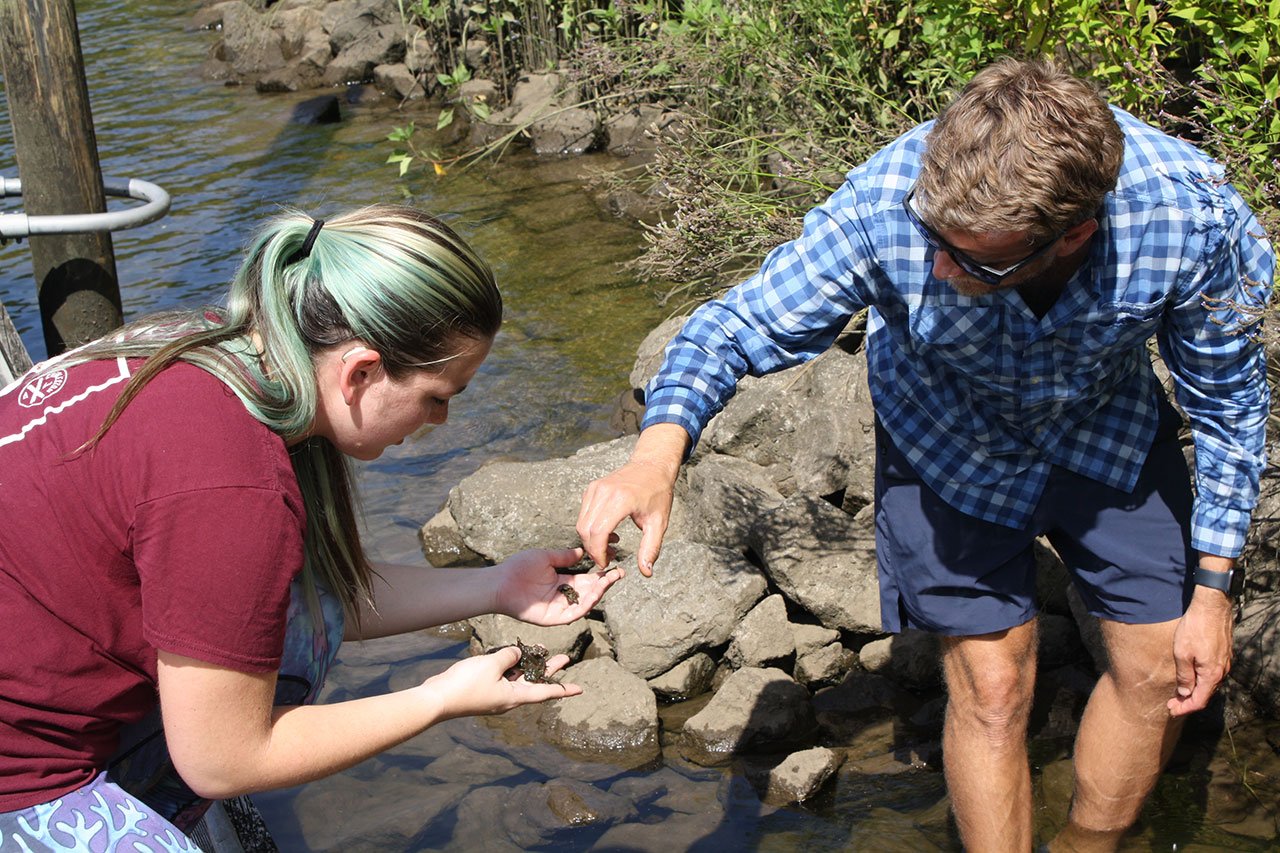Marine Biology Major
Explore new depths of aquatic species, marine habitats and the impact of human behavior.
In the marine biology program, you will discover undergraduate research opportunities. You'll be prepared for graduate school or a career in the sciences or a related field. Join fields such as oceanography, wildlife biology, aquaculture, environmental conservation, biomedicine and more.
Why study marine biology at the College of Charleston?
You'll benefit from our full-service marine lab, The Grice Marine Lab, located just minutes from campus. Attend research matchmaking day where you'll connect with faculty who will oversee your research projects. You may even present that research at national conferences. You'll also have access to small and large research vessels, a wet lab, an aquarium and a fish and invertebrate museum.
What will I learn?
This program offers flexibility so you can personalize your studies. Learn about biology, chemistry and physics. Study biological theories, concepts and processes. Gain hands-on laboratory skills and field techniques. You'll develop skills for data analysis, scientific communication and collaboration.
View Curriculum: Marine Biology
Program Highlights
-
Hands-On Learning
Research
Study Abroad
You will collect and analyze data on marine organisms. You'll study marine environments, such as estuaries and coastal ecosystems. You'll take part in a thriving undergraduate research program. We have diverse opportunities for students to conduct marine biological research. You'll collaborate with a faculty mentor in the lab or in the field.We sponsor a number of study abroad programs around the world. Students in these programs are exposed to tropical marine habitats and snorkel and dive in coral reefs and mangroves. Recent study abroad programs have gone to locations like:Internship Opportunities- Panama.
- Bali.
- British Virgin Islands.
- Bahamas.
- Little Cayman.
Our students regularly do internships and research with several local organizations.- South Carolina Department of Natural Resources
- Hollings Marine Laboratory
- National Oceanic and Atmospheric Administration
- South Carolina Aquarium
You may also find internships with:- environmental organizations.
- wildlife rehabilitation centers.
- government agencies.
- biotech companies.
You may do a year-long Bachelor’s Essay project. You will design a research project. You'll collect and analyze your data, and you'll learn to communicate your findings to an audience. You may present your research at local, national and international scientific conferences. -
Location
Charleston is home to diverse marine environments. Take advantage of easy access to local estuarine, coastal and ocean ecosystems. Our Marine Laboratory is right on the harbor. We partner with the South Carolina Department of Natural Resources Marine Resources Research Institute and the Hollings Marine Laboratory. Students also work with faculty at various field sites, including Hawaii, the Arctic and Antarctic.
-
Faculty Expertise
We have so many amazing faculty. This isn't a complete list, but a sampling of our faculty expertise includes:
- ecology.
- oceanography.
- anatomy and physiology.
- molecular and cellular biology.
- genetics.
- biomechanics.
- neuroscience.
- biodiversity.
- computational biology.
Faculty work on microbes, plants and animals. They study in marine, coastal, tropical, temperate and arctic ecosystems. Several focus on the effect of environmental change on biological systems.
Because our faculty have such a wide range of research interests, you'll have so many exciting opportunities in class and beyond.
Careers & Outcomes
- Biological researchers
- Oceanographers
- Laboratory and field technicians
- Medical doctors, dentists and veterinarians
- Health care professionals
- Environmental lawyers
- Scientific communicators
- Scientific artists
- Environmental consultants
- Wildlife and natural resources managers
- Ecotourism business operators


Diving into discovery
A love for the environment led Josie Shostak to the waters. Now she's raising awareness about local ecosystems and maybe discovering a new species along the way.
Read More